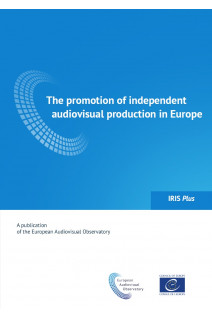The concept of independence means different things depending on the context. Indeed, the cinema and audiovisual industries use different definitions. Legislation also varies the definition of the concept of independence depending on the aim pursued. The EU’s Audiovisual Media Services Directive, for instance, speaks of independence vis-à-vis broadcasters. Interestingly, this means that, at least in theory, a big Hollywood studio production will be independent for the purposes of this directive.
This publication aims at providing an overview of many relevant issues concerning the independent production of films and audiovisual works in Europe, including market figures, international and national rules, interprofessional agreements and case law.
Executive summary 1. Setting the scene 1.1. Definition and role of independent audiovisual productions
1.1.1. Historical background to the concept of independent production
1.1.2. Scope of the definition
1.2. Characteristics of independent production
1.2.1. The size of independent production companies
1.2.2. The types of works concerned
1.2.3. Ownership of rights
1.3. The role of independent production for cultural diversity and democracy 1.4. Sizing independent production: the TV fiction case study
1.4.1. Background: TV fiction production in the European Union
1.4.2. Approaching the market share of independent production
2. International and European legal framework 2.1. International legal framework
2.1.1. UNESCO
2.1.2. Council of Europe
2.2. EU legal framework
2.2.1. Audiovisual Media Services Directive
2.2.2. Creative Europe
3. National frameworks 3.1. Overview
3.1.1. Definitions
3.1.2. Financial investment in independent production and quota obligations
3.1.3. Direct and indirect public funding for independent production
3.2. Case study analysis
3.2.1. AT - Austria
3.2.2. BE - Belgium
3.2.3. DE - Germany
3.2.4. FI - Finland
3.2.5. FR - France
3.2.6. GB - United Kingdom
3.2.7. IE - Ireland
3.2.8. IT - Italy
3.2.9. NO - Norway
3.2.10. PT - Portugal
4. Interprofessional agreements 4.1. DE - Germany
4.1.1. Framework Agreement
4.2. FR -France
4.2.1. Agreement France Télévisions 2019-2022
4.3. GB - United Kingdom
4.3.1. Codes of Practice
4.3.2. Terms of Trade
5. Case law 5.1. Court of Justice of the European Union 5.2. France 6. State of play 6.1. A challenging changing landscape
6.1.1. Public support for independent production
6.1.2. The emergence of online platforms and OTT players
6.1.3. New technological innovations
6.1.4. New business models
6.2. Impact of illegal distribution on the film and TV programmes industry 7. Annex




